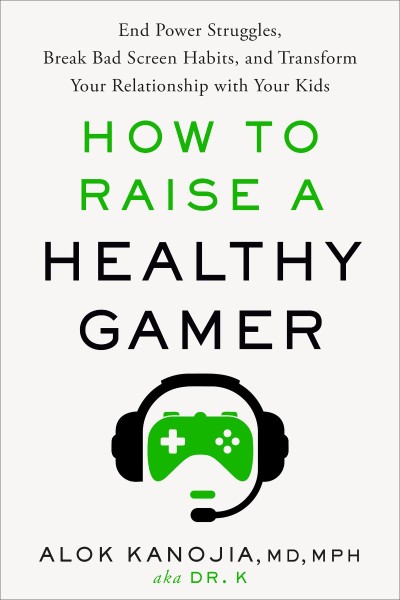Most Commented
How to Raise a Healthy Gamer: End Power Struggles, Break Bad Screen Habits, and Tr...




Description material

epub | 8.25 MB | English| Isbn:9780593582053 | Author: Alok Kanojia MD, MPH | Year: 2024
Description:
A former gamer and Harvard-trained psychiatrist offers a proven, tested plan to help parents define, set, and reinforce healthy boundaries around video games and help kids who have developed an addiction to gaming.
"I highly recommend this calm, structured, and nurturing approach to better and less screen use."—Tina Payne Bryson, PhD, New York Times bestselling coauthor of The Whole-Brain Child and No-Drama Discipline
How much should I let them play? How do I get them to be interested in anything else?!
When it comes to family rules around video games, most parents are at a loss. After all, our technologically invasive world is something previous generations didn't have to wrestle with, so we have no model for how to guide our families through the rapidly changing landscape, no blueprint for setting healthy gaming boundaries and keeping them in place.
A former Harvard Medical School instructor and one of the foremost experts on video game psychology, Dr. Alok Kanojia—known as "Dr. K" to his millions of followers—has firsthand knowledge of this modern issue: He needed professional help to break his own gaming habits in college, an experience that fueled his interest in learning how to help others. Drawing on Dr. K's professional specialization in working with people of all ages and varying degrees of addiction, and the most recent research from neuroscience and psychology, How to Raise a Healthy Gamer teaches parents a new skill set for negotiating gaming culture and offers solutions rooted in the science of treating addiction, including:
• An eight-week, step-by-step road map for setting, enforcing, and troubleshooting healthy gaming boundaries.
• Advice on how to react when your child becomes irritable, rude, or seemingly directionless.
• Essential communication strategies for reaching kids who have developed a serious gaming problem.
• The neuroscientific and psychological reasons that children gravitate to video games and how to help them meet these needs in real life.
• Insights and advice on dealing with behavioral issues that often accompany game use: ADHD, spectrum disorders, and substance abuse.
Whether your goal is to prepare your child for a healthy relationship to technology or to curb unhealthy amounts of time spent gaming, How to Raise a Healthy Gamer will help you better understand, communicate with, and—ultimately—empower your gaming enthusiast to live their best life.
"I highly recommend this calm, structured, and nurturing approach to better and less screen use."—Tina Payne Bryson, PhD, New York Times bestselling coauthor of The Whole-Brain Child and No-Drama Discipline
How much should I let them play? How do I get them to be interested in anything else?!
When it comes to family rules around video games, most parents are at a loss. After all, our technologically invasive world is something previous generations didn't have to wrestle with, so we have no model for how to guide our families through the rapidly changing landscape, no blueprint for setting healthy gaming boundaries and keeping them in place.
A former Harvard Medical School instructor and one of the foremost experts on video game psychology, Dr. Alok Kanojia—known as "Dr. K" to his millions of followers—has firsthand knowledge of this modern issue: He needed professional help to break his own gaming habits in college, an experience that fueled his interest in learning how to help others. Drawing on Dr. K's professional specialization in working with people of all ages and varying degrees of addiction, and the most recent research from neuroscience and psychology, How to Raise a Healthy Gamer teaches parents a new skill set for negotiating gaming culture and offers solutions rooted in the science of treating addiction, including:
• An eight-week, step-by-step road map for setting, enforcing, and troubleshooting healthy gaming boundaries.
• Advice on how to react when your child becomes irritable, rude, or seemingly directionless.
• Essential communication strategies for reaching kids who have developed a serious gaming problem.
• The neuroscientific and psychological reasons that children gravitate to video games and how to help them meet these needs in real life.
• Insights and advice on dealing with behavioral issues that often accompany game use: ADHD, spectrum disorders, and substance abuse.
Whether your goal is to prepare your child for a healthy relationship to technology or to curb unhealthy amounts of time spent gaming, How to Raise a Healthy Gamer will help you better understand, communicate with, and—ultimately—empower your gaming enthusiast to live their best life.
Category:Psychology, Parenting & Family, Social Sciences, Science & Technology, Computers, Engineering, Technology, Family - Assorted Topics, Social Sciences - General & Miscellaneous, Social & Cultural Aspects of Technology, Computer Business & Culture, Computer Technology, Psychological Disorders, Parenting - General & Miscellaneous, Social Aspects of Technology, Society & Cyberculture, Substance Use & Abuse, Psychopathology, Addiction->General and miscellanous
Warning! You are not allowed to view this text.
Warning! You are not allowed to view this text.
Warning! You are not allowed to view this text.
Join to our telegram Group
Information
Users of Guests are not allowed to comment this publication.
Users of Guests are not allowed to comment this publication.
Choose Site Language
Recommended news
Commented



![eM Client Pro 9.2.1735 Multilingual [Updated]](https://pikky.net/medium/wXgc.png)






![Movavi Video Editor 24.0.2.0 Multilingual [ Updated]](https://pikky.net/medium/qhrc.png)

